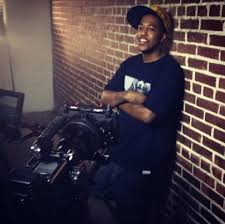
Highlighting Key Players in Hip-Hop
Even in the midst of Chicago’s ills, Cordaryll Ward is still proud of his city. While his hometown continues to be plagued with violence, there’s an emerging music scene out there that’s bubbling. This director, who got his start capturing artists like OJ Da Juiceman and Waka Floca Flame, plans to open the world’s eyes to his city and this musical uprising with his forthcoming documentary. “72 Hour Nightmare in Roseland” follows the 1994 tragedy of 11-year-old Robert “Yummy” Sandifer. In it, he uses the young Chicago hip-hop wave to narrate and give the film its voice. This documentary is Ward’s way of giving back to his community. He started his company Blind Folks Vision after years of hard work and education. After facing financial trouble with college, he was faced with two realities: either stay in the rough city of Chicago or leave to pursue his dream of being a director. In 2008, he found himself in Atlanta. He has since worked with a number of mainstream artists and built an impressive contact sheet and portfolio of music videos. Here Ward tells the story of his journey behind the lens and gives insight to inspiring video directors looking to follow in his path. Take notes.
When did you decide to become a director?
Jim Jones was my inspiration behind that decision. Back in the day, I was really into all of those video programs on BET like Rap City, Cita’s World, Hits from the Street and then 106 & Park came along. I used to watch TV a lot during that era. I remember a Dipset video coming on and seeing Jim Jones name in the credits listed as the director. I always wondered what it was that he was actually doing. Was he holding the camera? Was he coming up with the ideas? I started doing my research and I figured out that a director doesn’t really hold a camera. It’s really his vision and his interpretation of something. My passion for film stemmed from that initial research.
What happened next?
I just started working towards my dream of being a director. For college, I went to Columbia College for film in Chicago. It’s one of top film schools. Once I left there, I moved to Atlanta. I started off interning with a lot of people, you know, just volunteering my time. My first job came with Raw Report DVD. I made a few connects through them. Once I bought my own camera, I started freelancing and shooting free videos. I ended up shooting a video for Waka’s cousin Frenchie of BSM and everybody saw the video and liked it. After that, I started working with Waka Floca. Since then, I’ve been working with BSM and tons of other artists all over.
What have you noticed as you travel from state to state working with these different artists?
I learned that you have to embrace people’s culture no matter where you are. You can’t just be focused on ‘I’m from here. It’s popping here.’ Being that I don’t get caught up in that, I get to learn these artists’ languages, fashion sense and get an overall view of their world. It broadens my horizon.
What advice do you have for inspiring videographers?
If you’re going to do this, you must have good organization skills. I think it’s also a good idea to have patience. Being interpersonal is a key also. You have to make people feel comfortable with you and be able to get your vision across. If a person isn’t doing something right, you should know how to talk to them without offending them. You also have to be able to give and take constructive criticism.
What advice do you have for artists when it comes to their visuals?
They should always try to be hands on. My best videos are videos where the artist adds his or her two-cents to my concepts. People have their own vision of something. My vision might not be what a person wants for a video but if he tells me his ideas, I’ll get it. We can shed light on one another, especially since the artists are the ones writing the songs and it’s coming from their vision.
What’s next for you?
Well, I’ll be moving back to Atlanta for two months to film this documentary. With everything that’s happening in Chicago, I think it’s the right time for it. Here we are in 2013 and Robert “Yummy” Sandifer tragedy is still relevant. He was an 11-year-old kid whose life was tragically cut short. He was manipulated and mislead by gangs. Kid on kid violence is still a huge epidemic in Chicago and through Blind Folks Vision I hope to help bring awareness to this issue and if that saves one life, it’s worth it.
Being that you’re using the new wave of Chicago rappers to narrate it, do you find yourself in a mentoring position?
Yes. I feel like I’m in a position where I can open the door for other people. These young cats are in the mix. They are really in the field. I missed the Chief Keef wave since I was on tour with Waka but I feel like I could have helped them. I really want to help these artists see that there’s another way to make it. The things I’ve learned with Waka, I pass on to these young cats like Lil Mouse and Lil Bibby that I’m hands-on with. I try to show them how to really get paper and
hold it up.My motto is: Giving vision to everything the world is blind to. With Blind Folks Vision, I hope to do just that.
Follow Blind Folks Vision on Twitter: @BlindFolksFilms
-Danitha Jones (@LifeLikeJones)
